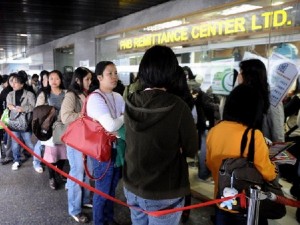
Filipino domestic helpers line up to send money at a remittance center in the central district of Hong Kong in this 2008 file photo. More Filipino households that depend on remittances from loved ones abroad are getting into the habit of saving, according to a recent Bangko Sentral ng Pilipinas survey.
AFP/TED ALJIBE
MANILA, Philippines—More Filipino households that depend on remittances from loved ones abroad are getting into the habit of saving.
This was according to a recent Bangko Sentral ng Pilipinas survey, which showed that in the third quarter, 36.8 percent of remittance-dependent households said they had used a portion of their money to augment their savings.
This was higher than the 35.5 percent registered in the third quarter of last year.
“Looking at the trend since 2007, one may see that there are more and more households dependent on remittances that are into saving,” said BSP Deputy Governor Diwa Guinigundo.
The year-on-year increase in the number of remittance-dependent households that are saving part of the money they receive from abroad was attributed partly to rising incomes that allowed family members to save more, and to improved financial literacy among Filipinos.
On a quarter-on-quarter basis, however, there was a drop in the number of remittance-dependent households that saved money.
In the second quarter, 44.5 percent of remittance-dependent households saved money.
“There are some fluctuations on a short-term basis, but there has been a general increase in the number of households that are saving money,” Guinigundo said.
In the first quarter of 2007, when the first survey of this kind was conducted by the BSP, only 7 percent of remittance-dependent households saved money, the central bank official said.
The latest survey results also showed that in the third quarter of 2012, 4.9 percent of remittance-dependent households invested a portion of their money.
Investments could be in the form of purchases of portfolio instruments or establishment of microenterprises.
The figure was down from 9.1 percent registered in the third quarter of last year and broadly unchanged from the 5 percent in the second quarter of this year.
But in the 2007 survey on savings and investment habits of Filipino household dependent on remittances, only 2.3 percent said they invested a portion of the remittances.
The BSP said that the improved numbers in 2012 indicated that Filipinos had gradually improved their financial literacy.
They had become more conscious about saving and investing, the central bank said.
Nonetheless, monetary officials admitted that financial education among Filipinos must continue.
They said Filipino households, more so those that are dependent on remittances, must learn to save and invest to better secure their future.
The BSP said it is promoting financial literacy through seminars on saving and investing in various parts of the country and in cities abroad where there are big communities of overseas Filipino workers.
Last week, the BSP and the Organization for Economic Cooperation and Development (OECD) held a financial literacy program in Mactan, Cebu.
The audience included students, professionals and individuals wanting to put up micro-businesses.

